Air Force vet to full-time volunteer with dogs
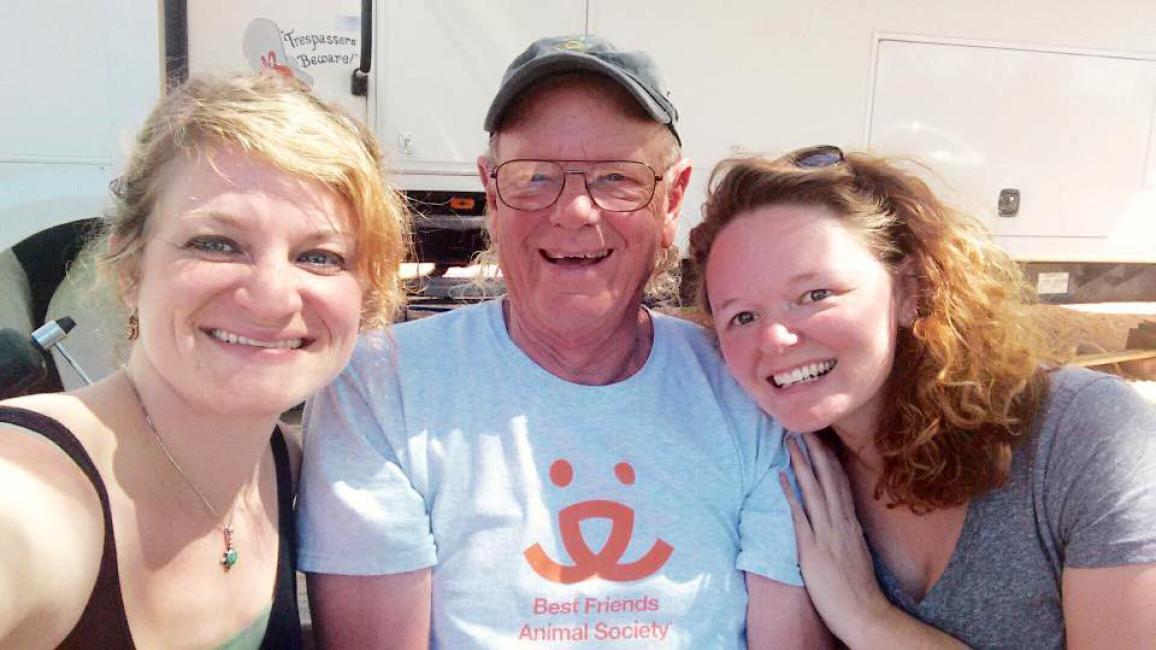
This isn’t a sad story. The hero of it is no longer with us — but only in a sense because Bill Splitter’s legacy of kindness is still going strong. Bill had no pets of his own, yet he cheerfully dedicated years of his life to helping countless animals as a volunteer with Best Friends.
His story is about finding your people, being truly needed, and having purpose, especially later in life when the demands of a daily job are no longer there. And it’s about the power of sitting with a scared dog and how that can change life for both of you.
Everyone’s volunteer origin story is unique, and for Bill it began when his daughter, Trischa Splitter, came to Best Friends Animal Sanctuary for an internship in 2004. He visited her there, and that turned out to be the first of many times he’d make the long drive from St. Louis, Missouri, to Kanab, Utah. “He fell in love with Kanab and with the dogs. It opened his eyes to a part of the country that he hadn't really been to a lot,” Trischa says.
Not long after Trischa’s internship ended and Bill returned home to St. Louis, Hurricane Katrina hit New Orleans, and Best Friends joined the effort to rescue thousands of displaced pets. Trischa got an email about the need for volunteers, and though she couldn’t go, she forwarded it to her dad. Her dad had served 22 years as a tech sergeant in the United States Air Force and then worked another 20 years at one job in the private sector before retiring. She thought of him, she explains, because Bill had been feeling a little depressed without having a job where he was needed.
Trischa says, “He called me the next day and said, ‘I got in touch with Best Friends. I’m heading out.’” Bill arrived in New Orleans at a temporary location set up on Magazine Street and dove in to help pets displaced by the storm. Always a hard worker — skilled at organizing and streamlining things and willing to do grunt work like mopping the floor or anything else that needed doing — Bill’s talents were put to use. He stayed for several weeks.
The work he did in New Orleans was incredibly helpful to the effort, but it also sparked something that had been missing for Bill.
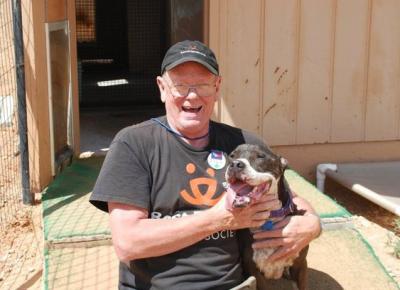
A loyal volunteer
Operations wrapped up in New Orleans, and for the next couple years Bill made do with a few trips to the Sanctuary in Utah. But then Best Friends began a program to move dogs rescued from puppy mills — as many as 200 at a time — from Missouri to shelters and rescue groups in New York. Bill was one of the first people to volunteer.
He became the logistics specialist for the project, and as it evolved over the months, Bill became one of the core people on the team. He kept track of all the supplies needed to take in, vet check, and send off a large number of dogs — all in a three- to four-day project. He spent hours setting up, cleaning, and then breaking down and putting away crates. If something needed fixing, Bill was the go-to guy. He’d hold dogs for the vet and gently load them into the vehicle that would drive them east toward new homes.
[An enormous thank-you to Best Friends volunteers]
In those days, Bill always stayed behind once the dogs left St. Louis. But soon he looked for ways to help in between those intense, short-term projects. There was always a need for someone to drive animals, and that became one of Bill’s specialties. He signed up for a local organization and would often head out in his truck to pick up and drop off pets who needed to go into a rescue organization or who were headed to a new home from one. Trischa says, “He just loved driving. Transporting became his new thing.”
And he never stopped volunteering with Best Friends. He began going to the Best Friends National Conference each year, helping with the massive task of setting up and tearing down everything. He helped at Strut Your Mutt. And if ever there were a driver requested near him to move animals to the Sanctuary, it was like Bill had just been waiting to be asked.
That was how Bill came to be known by so many different people at Best Friends; he helped in so many ways and on different types of projects. He became the go-to guy not just for one thing or one event or one project. Soon there were countless Best Friends staff and fellow volunteers who found him indispensable — because he was.
Trischa understands that sentiment well about her dad. She says, “He was very loyal, and that was something that was amazing about him — is that if he promised something, he would do it.”
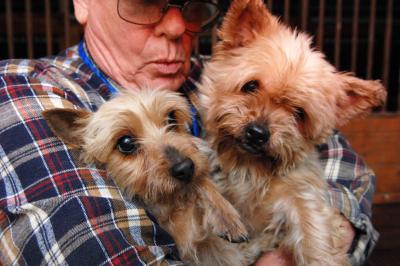
A new life in Kanab, Utah
In 2015, Bill did just one thing that a person could argue was out of character for him. He moved away from St. Louis, the place he’d called home for decades.
But the big move was to Kanab where he could volunteer daily at the Sanctuary, rather than wait to be called up for a special event or project. For the next five years, Bill would report for duty most days of the week at Dogtown, one of the areas at Best Friends Animal Sanctuary.
This was different from a project or an event. There wasn’t setup and teardown to do; there were so many different jobs to do every day. It’s no surprise that Bill soon became a key part of the team. He became the official Dogtown greeter, welcoming volunteers and accompanying them to their assigned areas for the day. He worked in the admissions building, feeding, cleaning, spending time with the dogs, doing countless loads of laundry, and washing dishes.
In an interview several years ago, Bill said it was “a special treat” to help in Dogtown admissions because he got to see every new dog who arrived and followed their progress until they were adopted.
All that time spent with scared dogs rescued from puppy mills and Bill’s naturally calm demeanor meant that he had a knack for working with shy dogs. “One particular dog was special to me. Kay was her name. She did not want anything to do with humans; she would not get out of her crate even with the top off. I worked with her a little each day I was there, and after many months she was ready for adoption. She is now learning French in British Columbia with a very happy couple.”
[Volunteer dog transporter saves animals' lives]
And he kept up with his other roles when he was needed, which was often. Kim Beck from the national volunteer team says, “Need someone to stand in the blazing sun and direct traffic at an event? Bill would do it. Or it’s 10 a.m. in Kanab, Utah, and you need someone to leave at noon to pick up dogs in Houston? Sure, Bill would go.”
Bill was legendary when it came to the miles he drove to get animals where they needed to go. He once shared, “After I moved to Kanab I was asked if I would like to drive some cats to Portland, Oregon. Of course, I said OK. Little did I know that I would wind up doing 20 round trips over two years. 22,000 miles.”
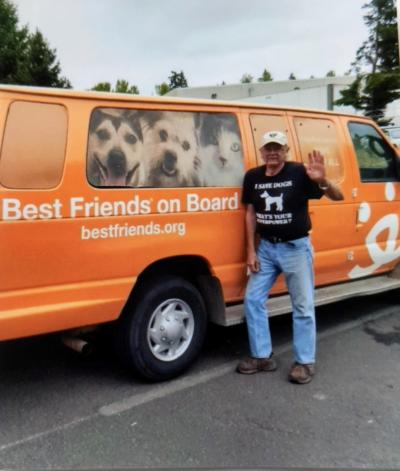
The best years
If you knew Bill in one of his many volunteer roles, you knew that it didn’t take much for his emotions to spill over. He would greet old friends with a hug, a smile, and tears. Trischa says that he wasn’t always that way. He was always a caring and supportive parent who loved her unconditionally, but, she explains, “he was pretty closed up emotionally.”
That changed when he began volunteering full time. “I think that working with the shy dogs, especially, allowed him to feel things,” Trischa says. “It put him in touch with his emotions and allowed him to be himself free of judgment, just the way he did with the dogs.”
Bill was busier than ever between his time at Dogtown and driving animals all around the country when he found out that he had colon cancer. That was in 2020, and he was able to stay in Kanab and keep doing what he loved for a time. But eventually the cancer and medical treatment for it became so intense that he had to stop and move back to St. Louis for care and to be near his daughters, Trischa and Elizabeth.
He passed away in the summer of 2022, leaving behind his daughters and everyone he knew at Best Friends.
That was also when Bill’s collective impact started to become clearer, as so many people who knew him learned that he was gone. There’d be no more tearful hug greetings. No more Bill raising his hand to help. No more Bill sitting on a bench under a tree in Dogtown to comfort a scared dog.
Kim got the news two weeks before the Best Friends conference. “We were devastated when he died,” she says. He never missed a conference, and it would have been his seventh time volunteering that year. She and the team dedicated the volunteer room to him and filled it with photos of their friend.
People at Dogtown and from all corners of Best Friends shared their favorite stories and photos for Bill’s memorial service. And while he had lifelong friends from the Air Force and his civilian career, his fan base at Best Friends was the largest — especially if you count the hundreds, if not thousands, of animals.
Trischa shares that the last several years were the best of Bill’s life. “He found his people, his friends, and his purpose, and he was the happiest he’d ever been,” she says. “So as much as he was an asset to Best Friends, the community there really changed him for the better in so many ways, and it was amazing for me and my sister to watch him become so connected with himself and so happy. It was incredible to see.”
So, you can see why this isn’t a sad story. Many people miss Bill every day, but the pain of missing him is only there because of knowing him, and that is a gift that will never go away. If ever there were a person whose footsteps to follow as animal lovers, it’s Bill. And if his story inspires even one person to sign up to pitch in like he did, it’s a safe bet that it would make him happy and maybe even shed a tear.
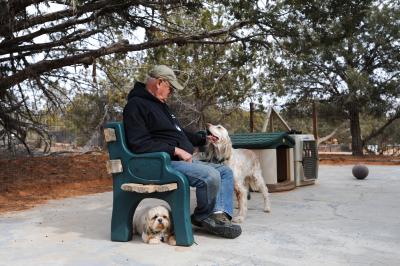
Your local shelter needs you
One of the greatest gifts you can give homeless pets at the shelter in your community is your time (and maybe a treat or two).
Read more
Lifesaving rides for pets in Navajo Nation
Artful peer-to-peer collaboration and pet transport Trello boards save 160-plus East Coast cats